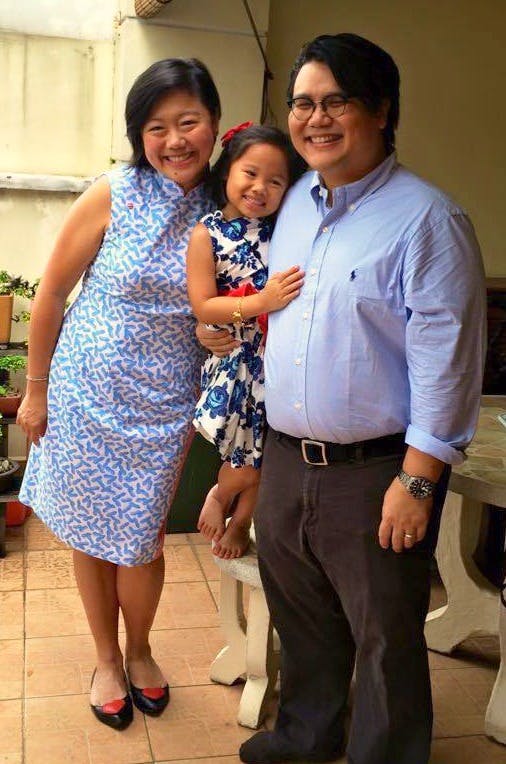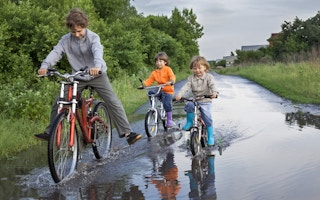If you are a parent, you might be glad to be living in the 21st century. Advances in technology in all its forms — video baby monitors, advanced safety features in family cars, even tablets with game apps — exist to make it easier to take care of our children.
To continue reading, subscribe to Eco‑Business.
There's something for everyone. We offer a range of subscription plans.
- Access our stories and receive our Insights Weekly newsletter with the free EB Member plan.
- Unlock unlimited access to our content and archive with EB Circle.
- Publish your content with EB Premium.
We are also better equipped than previous generations to watch over their physical, mental and emotional well-being, thanks to both improved medical care and easier access to expert advice and information on parenting.
But this modern world is also the source of much doubt and anxiety for many parents, because our children are unlikely to inherit a world that is as vibrant and healthy as they deserve.
There is ample evidence that the world is on an unsustainable path: according to the United Nations Environmental Programme (UNEP), many of the Earth’s ecosystems are nearing critical tipping points of depletion or irreversible change, pushed by high population growth and economic development.
By 2050, if current consumption and production patterns remain the same, and with a rising population expected to reach 9.6 billion, we will need three planets to sustain our ways of living and consumption.
As bleak as this reality may sound, parents can do something to change this trajectory.
The key is in raising our children to be different from the generations that came before them by influencing the way they think about the environment, and specifically, the inextricable relationship between our actions and behaviour and the planet.
This will require the current generation of parents to embrace a new form of parenting, which starts with setting the right examples for the next generation.
A look at the many “green parenting” lifestyle and blogs such as Sustainababy (from Australia) and Parentlink (based in Singapore) shows that there are many things parents can do to reduce our impact on the environment.
For example, one can switch to organic foods, use cloth diapers (or even implement early potty training) and re-use pre-loved toys.
Implenting such sustainable habits into daily life — from recycling to composting, to saving water and energy — is crucial to demonstrating to our children that caring about the planet requires mindful consumption.
Beyond decreasing waste and using non-toxic products, parents also play a significant role in our children’s education.

(from left) Serene Koh, Sophie and Jude Yew celebrate the Lunar New Year in 2015
For Singaporean researcher Serene Koh, 39, educating her six-year-old daughter Sophie on environmental concerns is a matter of course, and involving her in lessening the family’s carbon footprint by teaching her about recycling and making it a part of the daily routine helps to make this kind of green behaviour second nature.
Regular family visits to the nearby MacRitchie Reservoir Park provide opportunities for Sophie to learn about indigenous flora and fauna, as well as to develop a deeper appreciation for the natural world.
Koh and husband Jude Yew, an assistant professor at the National University of Singapore, also employ current news topics to widen Sophie’s scope of environmental knowledge.
“We talk to Sophie a lot about taking care of the environment because it’s the only one we have and she’s going to live in it long after we’re gone,” says Koh.
While children may learn about the science behind climate change in school, it is up to parents to help them turn the knowledge into something that makes a real-world difference.
Encouraging eco-conscious habits, such as always turning out lights when they are not in use, or taking shorter showers, or even taking the trouble to walk a little further to put recyclable trash into the right bin, can help to engender a lifelong respect for the environment.
When this outlook is ingrained, the child does not have to grow up to be an environmental scientist, engineer or activist to be part of the global climate solution.
Their level of awareness can create ripples of positive impact on other aspects of their life such as their consumer patterns, their driving habits, even their diets.
Ultimately, teaching them to appreciate the world around us can foster the attitude that taking care of ourselves cannot be done without also taking care of the environment.
Here are some resources to help you embark on a greener parenting path:
- Ecology Kids - Ecology Global Network (EGN), a web portal that provides information on environment-related issues, is a comprehensive source of materials for kids interested in the subject and parents who want to guide them along
- Communicate With Your Kids About Climate Change - Scholastic, a publishing company that specialises in children’s literature, offers some useful tips on how to engage younger and older kids in the climate change discussion.
- Eco-Parenting in 8 Simple Steps - care2.com, a green lifestyle site, lists the ways in which you can start green living with your kids
- What parents can do - The Center for Climate Safety is a carbon-awareness hub based in the United States, and has vast resources - ranging from links to podcasts and video clips - to bring out the environmentalist parent in you
- Maybe the Lorax, Bambi and Wall-E Can Save the Planet - EGN has a list of child-friendly movies that can help you start or further discussions about human impact on the environment.
- Environmental Novels: Juvenile and Young Adult Fiction - A list of fiction works about the environment and pollution, more suited to older kids, from the library at the University of Illinois (Urbana-Champaign)











